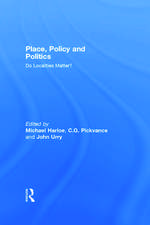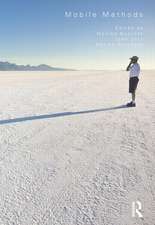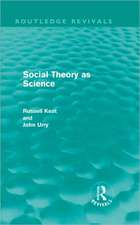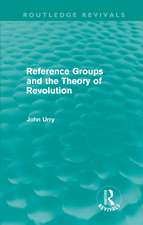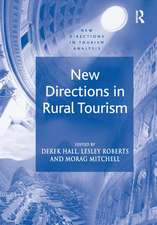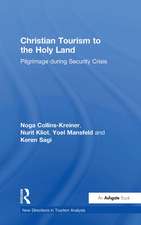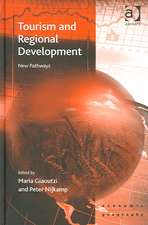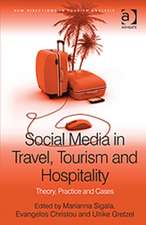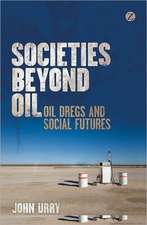Performing Tourist Places: New Directions in Tourism Analysis
Autor Jørgen Ole Bærenholdt, Michael Haldrup, John Urryen Limba Engleză Hardback – 22 iun 2004
| Toate formatele și edițiile | Preț | Express |
|---|---|---|
| Paperback (1) | 469.34 lei 6-8 săpt. | |
| Taylor & Francis – 16 mai 2017 | 469.34 lei 6-8 săpt. | |
| Hardback (1) | 764.20 lei 6-8 săpt. | |
| Taylor & Francis – 22 iun 2004 | 764.20 lei 6-8 săpt. |
Din seria New Directions in Tourism Analysis
-
 Preț: 394.09 lei
Preț: 394.09 lei - 18%
 Preț: 1055.51 lei
Preț: 1055.51 lei - 14%
 Preț: 312.43 lei
Preț: 312.43 lei - 18%
 Preț: 1052.35 lei
Preț: 1052.35 lei - 14%
 Preț: 338.06 lei
Preț: 338.06 lei -
 Preț: 469.34 lei
Preț: 469.34 lei - 15%
 Preț: 420.64 lei
Preț: 420.64 lei - 18%
 Preț: 1054.71 lei
Preț: 1054.71 lei - 26%
 Preț: 764.20 lei
Preț: 764.20 lei - 31%
 Preț: 767.74 lei
Preț: 767.74 lei -
 Preț: 474.14 lei
Preț: 474.14 lei -
 Preț: 489.26 lei
Preț: 489.26 lei -
 Preț: 469.34 lei
Preț: 469.34 lei - 18%
 Preț: 1054.71 lei
Preț: 1054.71 lei - 18%
 Preț: 1005.01 lei
Preț: 1005.01 lei -
 Preț: 469.34 lei
Preț: 469.34 lei - 25%
 Preț: 767.88 lei
Preț: 767.88 lei - 26%
 Preț: 847.73 lei
Preț: 847.73 lei - 28%
 Preț: 877.59 lei
Preț: 877.59 lei - 18%
 Preț: 1054.71 lei
Preț: 1054.71 lei - 18%
 Preț: 1063.41 lei
Preț: 1063.41 lei - 26%
 Preț: 765.40 lei
Preț: 765.40 lei -
 Preț: 469.34 lei
Preț: 469.34 lei - 24%
 Preț: 321.28 lei
Preț: 321.28 lei - 15%
 Preț: 334.55 lei
Preț: 334.55 lei -
 Preț: 469.34 lei
Preț: 469.34 lei -
 Preț: 323.23 lei
Preț: 323.23 lei - 28%
 Preț: 741.53 lei
Preț: 741.53 lei - 26%
 Preț: 736.38 lei
Preț: 736.38 lei - 18%
 Preț: 1053.16 lei
Preț: 1053.16 lei - 14%
 Preț: 338.61 lei
Preț: 338.61 lei - 25%
 Preț: 768.46 lei
Preț: 768.46 lei - 31%
 Preț: 764.20 lei
Preț: 764.20 lei - 18%
 Preț: 1000.27 lei
Preț: 1000.27 lei
Preț: 764.20 lei
Preț vechi: 1027.40 lei
-26% Nou
Puncte Express: 1146
Preț estimativ în valută:
146.23€ • 153.11$ • 121.29£
146.23€ • 153.11$ • 121.29£
Carte tipărită la comandă
Livrare economică 09-23 aprilie
Preluare comenzi: 021 569.72.76
Specificații
ISBN-13: 9780754638384
ISBN-10: 0754638383
Pagini: 182
Ilustrații: Includes 64 b&w illustrations
Dimensiuni: 156 x 234 x 19 mm
Greutate: 0.45 kg
Ediția:New ed.
Editura: Taylor & Francis
Colecția Routledge
Seria New Directions in Tourism Analysis
Locul publicării:Oxford, United Kingdom
ISBN-10: 0754638383
Pagini: 182
Ilustrații: Includes 64 b&w illustrations
Dimensiuni: 156 x 234 x 19 mm
Greutate: 0.45 kg
Ediția:New ed.
Editura: Taylor & Francis
Colecția Routledge
Seria New Directions in Tourism Analysis
Locul publicării:Oxford, United Kingdom
Cuprins
Contents: Castles in the sand; Producing tourist places; Consuming tourist places; Staging the beach; Photographing attractions; Memory work; Inhabiting, navigating, drifting; Places, performances and people; Bibliography; Index.
Notă biografică
Jørgen Ole Bærenholdt and Michael Haldrup are both Associate Professors, and Dr Jonas Larsen is a Teaching Assistant. They all work in the Department of Geography and International Development Studies at Roskilde University, Denmark. John Urry is a Professor in the Department of Sociology at Lancaster University, UK.
Recenzii
’...a very important contribution to the current discussion about tourism and places...the content of the book brings up-to-date perspectives about tourist practices, performances, and mobilities and also raises questions about production, consumption and representation of places where the concepts of time and space are central.’ Professor Lars Aronsson, University of Kalmar, Sweden ’...a genuine theoretical advance in tourism studies, [which] combines philosophical sophistication with lucid, unpretentious writing. With its insistence upon replacing reifying concepts and mechanical theories with a theoretical perspective that does justice to the hybrid nature of human performances, and of the time and space they bring into being, this book transcends the narrow bounds of Tourism Studies, or even Human Geography...’ Dr Judith Adler, Memorial University of Newfoundland, Canada ’...an insightful new cut on the multilayered and interwoven fabric of tourism. It offers a nuanced account of what tourists and institutions do in order to make holidays happen. With illuminating attention to the fabric of everyday life in a series of ethnographic examples, this book puts the real holiday experience in the foreground.’ Mike Crang, University of Durham, UK
Descriere
This book looks at the making and the consuming of places in the contemporary world. Illustrated through a case on Denmark, it considers the general arguments about the intersections of places, performances and peoples. It is shown that those who are visitors to a place in part produce that place through their performances. Places are intertwined with people through various systems that generate and reproduce performances in and of that place. These systems comprise networks of ’hosts, guests, buildings, objects and machines’ that contingently realize particular performances of specific places. The studies reported here further develop what we might describe as the ’new mobility’ paradigm that is developing within the social sciences.

